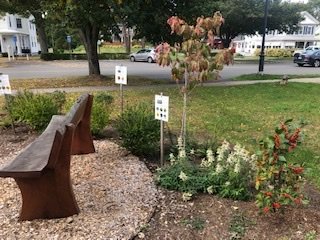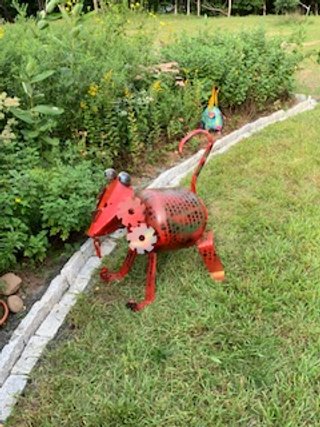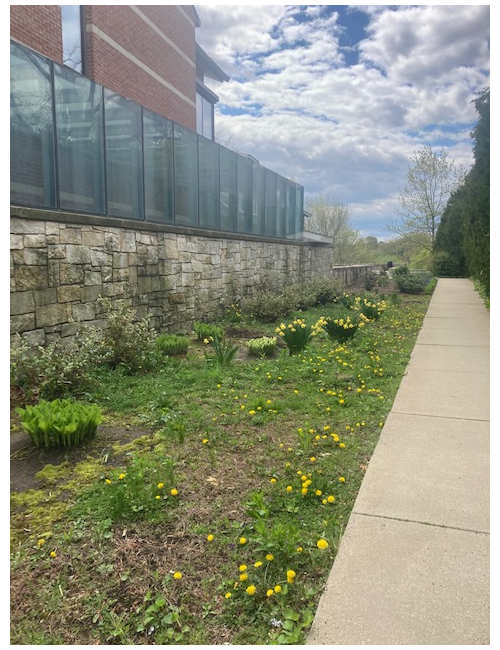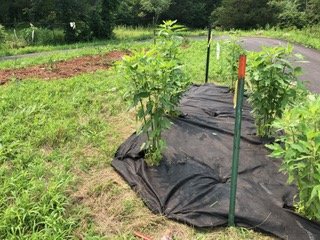2021 Grant Project Reports
CMGA is the alumni association for certified Connecticut Master Gardeners providing opportunities to share our knowledge and love of gardening with others. Through sponsorship of Grants and leadership of volunteer projects throughout the state, CMGA members are helping to educate and beautify our communities.
Most recently, in 2021, through the generosity of our members and other donations, we were able to award $4,500 in Grants for Master Gardener and Intern projects.
Please use this interactive map to see the scope and impact that these projects are making in communities across Connecticut.
E.C. Scranton Memorial Library Pollinator Garden, Madison
This educational native plant garden was designed to connect the E.C. Scranton Memorial Library to the Madison Pollinator Pathway. Signage explains the importance of the chosen native shrubs to native pollinators, and native perennials are identified throughout the garden as well.
The project initiated an ongoing partnership among the Library Board, the Library Director and the larger community with the shared goal of educating the public on the importance of native plants. The library took the initiative to contact “Call Before You Dig” before planting started. The Master Gardeners worked to design the garden in a way that supports the Library’s educational programming, including visits from the public to the garden. Local vendors were willing to deliver soil and mulch before their season opened and expressed a desire to help in the future. Local Girl Scouts designed and built a garden bench that sits in the garden pathway. Based on the garden collaborative success, an additional perennial garden is planned on the side of the building.
How CMGA helped:
The $350 grant awarded paid for perennials, wood chips for the pathway and to help with the cost of mulch.
ANNIE FISHER STEM SCHOOL GARDEN, Hartford, CT
COVID changed the amount of time that students and teachers could give to gardens at Annie Fisher STEM and Annie Fisher Montessori Schools, which straddle a garden with five raised beds that had previously produced over 250 pounds of vegetables for donation to Hands on Hartford and for the Hartford Mobile Market. But perseverance of Master Gardeners resulted in the beds being planted with vegetables, flowers and herbs as well as repair of the beds and the addition of donated soil and compost.
WIth the start of the new school year, Montessori school students visited the garden, learning the names of plants, cutting bouquets of flowers for the classrooms and helped harvest vegetables and collect dried seeds and finally, plant cover crops. Gardening education was incorporated into the classroom and the students are looking forward to Spring 2022 and thinking about what to grow next.
HOW CMGA HELPED:
Funds were granted to purchase organic hay mulch; pollinator friendly perennials; tomato cages; replacement boards; and basalt rock dust. Unspent dollars will be used in the second half of the school year when greater teacher and student involvement is anticipated.
BRAINERD LIBRARY BUTTERFLY GARDEN, Haddam, CT
The expansion of a butterfly garden at the Brainerd Library in Haddam was delayed by a construction project for a new entrance. But the positive impact was that the butterfly garden had an opportunity to be further expanded as part of the construction and was better incorporated as part of the entrance. Everyone using the new entrance will walk by the garden, so it will be viewed and admired by the community.
Originally planned for the spring, the garden was reworked in September, 2021 into a 5-foot wide arc. It was composted and edged with granite pavers. A new granite bench was purchased with hopes it will be used for observing the garden and quiet reflection.
Due to Covid, the Library’s Children’s Department held their Tuesday and Thursday morning programs outside, close to the butterfly garden. The parents sat on the bench and the butterflies got lots of attention from the children. It has also provided an opportunity to educate visitors about creating a pollinator-friendly space. Comments about how messy the garden looked provided an opportunity to explain that “butterflies don’t really go for the manicured look”, and, in fact “like plants sometimes considered to be weeds.”
LYME-OLD LYME FOOD SHARE COMMUNITY GARDEN
Food insecurity brought on by COVID impacted the entire state of Connecticut, including the towns of Lyme and Old Lyme. In response to that need, an ambitious goal was set to establish a FoodShare garden to provide fresh produce to area food pantries.
Without as much as a place to plant, the initiative formed a 501(3) (c) non-profit organization with a Board of Directors. Next, they were able to secure land within a Lyme-Old Lyme recreation facility near a playground which has parking, restrooms, electricity, and plenty of sun and water. The CMGA grant of $350 was the first step in a SustainableCT matching grant campaign. In total, $7500 in donations from 42 supporters was matched by SustainableCT. Costs to plant and maintain a row are estimated at $250 a year. An annual sustaining fundraising campaign has been launched to “Sponsor a Row.”
With funding secured, deer fencing was installed and an irrigation system was connected to the recreation facilities irrigation system, 6 raised beds were built and 16 are ready for planting in 2022. A mailing list of 55 volunteers has resulted in a consistent crew of 10-15 volunteers for scheduled workdays. Over 20 rows are committed for the 2022 planting season.
HOW CMGA HELPED:
The CMGA grant of $350 was the first step in a Sustainable CT matching grant campaign and was used to create the community garden.
THE LEAP CHILDREN’S GARDEN
The LEAP Children’s Garden at 31 Jefferson Street, New Haven brings garden instruction and a beautiful haven with blooming flower beds and healthy raised vegetable beds for inner city New Haven children.
In 2020, due to COVID, the younger children were on remote learning, but the 13–15-year-old Leaders-in-Training were able to participate in our garden classes.
In early October, we had a family harvest day where members of several LEAP families came to the garden and received flowers and a bag of fresh organic vegetables.
HOW CMGA HELPED:
The most critical factor in our success was the dedication and very hard work of 3 committed Master Gardeners who worked multiple times per week. LEAP has no funds at all for garden maintenance, and the CMGA Grant was extremely helpful in permitting us to obtain essential tools and materials (including soaker hoses, hose timers, stakes, organic soil amendments) and plants.
UCONN EXTENSION BUG WEEK
Bugs are the unsung heroes of our ecosystem, providing services such as pollination and natural pest control. CMGA was asked to help expand the resources found on the Bug Week website for families and educators. In its seventh year, Bug Week’s educational program stimulates scientific curiosity in approximately 500 children and adults each summer, including identifying key beneficial insects including bees, mantids, butterflies and other pollinators.
Free Bug Adventure Kits and activity booklets were sent to children who answered a few simple questions on the website. An electronic copy of the activity booklet was made available to post on ctmga.org. Finally, participants learned how to change their yards and home environments to be more pollinator-friendly by adding native plants to their yards.
HOW DID CMGA HELP?
COVID-19 restrictions prevented in-person Bug Week events, so the grant was used to create new educational information on native plants, beneficial insects, and caterpillars. A new educators’ tab on the website assists teachers in creating insect-related lessons which align with curriculum objectives.
MARK TWAIN HOUSE DEMONSTRATION GARDENS, Hartford
When visitors to the Mark Twain House and Museum in Hartford travel up the pathway to enter the building will now be able to enjoy a series of new gardens. Handicapped accessible, "children of all ages" will be able to enjoy and learn from multiple demonstration and experimental gardens that will change annually.
Started in 2020, Master Gardeners removed tall weeds, rocks and debris and replaced them with 6 foot square raised beds, connected by perennials and shrubs to surrounding garden areas. Ready for planting, Master Gardeners, Master Gardener Interns and gardening volunteers have been invited to collaborate, plan and plant. Garden plans include Victorian designs, sensory gardens, square foot gardens, children's gardens (pizza garden, kindness garden) and monochromatic gardens.
Visited by many school groups, families, and organizations, youth and interested adults are encouraged to participate in a "scavenger hunt" as they go through the house and museum and it is anticipated the gardens will be included. A comprehensive garden guide is in development and future plans include reaching out to schools to provide service learning projects.
COMMUNITY GARDEN AT SPENCER VILLAGE, Manchester
Started in 2014 at the Manchester Housing Authority’s residential complex in Manchester, Master Gardeners assist the Spencer Village residents, who are low-income, elderly and moderately disabled citizens plant and grow vegetables and flowers. Today, it includes 16 individual raised beds with mulched walkways between the planting beds, two gates and a 4-foot deer fence.
Despite the wet, cool spring, the gardens were thriving by mid-summer with a wide variety of vegetables, including onions, beans, summer squash, cucumbers, lettuce, potatoes, radishes, tomatoes, peppers, collards, Brussels sprouts, herbs, strawberries and raspberries. In the fall, the garden beds were cleared of weeds and debris, and put to bed under a layer of grass clippings.
This year, in particular, the residents really enjoyed having a safe outdoor activity, working in the garden and helping with the various garden chores. The harvest is always bountiful, and is shared by all residents.
HOW DID CMGA HELP?
The Manchester Housing Authority is very supportive of the garden, providing water and other materials, free of charge. To date, CMGA has been the only source of financial support for purchases such as seeds, plants, fertilizer, and other garden equipment.
TORRINGTON COMMUNITY GARDENS, Torrington
The Torrington Community Gardens have two major goals each year. First, to provide fresh vegetables to area food insecure individuals and families throughout the growing season. Second, the project aims to provide an opportunity for Master Gardeners and Interns to apply the skills they learned in the classroom in the field.
They also plant at two different locations. The 600 square foot Jiggs Donahue Park Garden is located in the north end of Torrington and provides fresh produce to the Nurturing Families program to distribute during their home visits to pregnant women and families in Torrington and Winchester. Also 600 square feet in size, the Borzani Park garden was created in 2020 by the Litchfield Master Gardener office at the request of the Mayor. It supports the Friendly Hands Food Bank which distributes food throughout Northwest Connecticut. The need for their services has tripled since the pandemic, with up to 34,000 meals provided in one month.
The Community Garden team was very pleased with the amount of produce donated to the food pantry and the variety, which was produced through the growing season. At the end of the season, they developed a row crop cover system to shelter some greens and had their last harvest on November 15. The garden will receive an addition of composted manure before spring.
HOW CMGA HELPED:
Funds supported the purchase of seeds and planting supplies for the two gardens.
PERMACULTURE DEMONSTRATION GARDEN, EDIBLE LANDSCAPE, Pomfret
Now in its third year, this demonstration garden’s volunteers continued their planting of native trees, woody perennials and smaller perennials to attract pollinators with the overall goals of soil building, wildlife support and increasing biodiversity with the use of “live mulch” and other sustainable practices. Since the location was originally overgrown, maintenance, clearing and improving access to the site continue to be a focus. Volunteer support from a mason allowed the installation of concrete steps.
Deer have also noticed the work that is being done and the Permaculture team is starting to “cage” small bushes and change their plant choice to include more “deer tolerant” perennials and trees.
HOW DID CMGA HELP?
The CMGA grant was used to cover material costs for the concrete steps, as well as the installation of a gutter and rain barrel on a storage building. Remaining funds will be used for very early spring planting of trees, shrubs and perennials.
BETHEL SCHOOL STUDENT GARDEN, Bethel
Three Master Gardener Interns, Bethel students, community seniors and volunteers all benefited from the redesign, rebuild and rejuvenation of two garden beds at the Bethel School Student Garden.
The existing crumbling wooden raised garden beds were replaced with nine-foot galvanized steel beds over two Saturdays. The new beds were constructed, filled and planted with white potatoes, sweet potatoes and beans. The produce benefited the lessons of first and second graders at the school, as well as the community members who garden the site and extra produce was given to individuals at the Reynolds Ridge Senior Community.
The volunteer time of community members who oversee the management of the garden as well as the manpower of the MG Interns made this effort a success.
HOW DID CMGA HELP?
The CMGA grant was applied to the cost of the galvanized beds. The approval and cooperation of the Bethel Schools Activity manager/High School Vice Principal as well as private donations made up the cost gap between grant funds and actual cost.
THE GIVING GARDEN, Newington
With ongoing support from the Newington Senior and Disabled Center, this garden provides gardening experience and programming to seniors and disabled people and other interested volunteers. The fresh produce grown here is distributed to low-income residents in the community, via the Newington Food Pantry.
In 2021, the core group of 6 volunteers (which includes Master Gardeners, seniors and disabled individuals), was able to harvest over 360 lbs of fresh, organic produce which was donated to the Newington Food Pantry. In addition, they offered gardening experience and education to 20 teens enrolled in the Parks and Recreation’s “Leaders in Training” program.
HOW DID CMGA HELP?
The grant was used to purchase five sets of “5-Panel Critter Fence Kits” to help prevent animal damage to the garden.
COMMON GOOD GARDENS, Old Saybrook
Since its inception in 2002, Common Good Gardens has grown and provided fresh produce to the Shoreline Soup Kitchens & Pantries, which serves food insecure individuals and families in our shoreline communities. The plentiful gardens produce pesticide- and herbicide-free fruits, vegetables and herbs. This produce is delivered within hours of harvest to the local Shoreline Soup Kitchens & Pantries.
In 2021, the total produce supplied to Shoreline Soup Kitchens and pantries exceeded 9,000 lbs, which was a record for the garden.
Additionally, Common Good Gardens gives seminars and works with volunteers to demonstrate labor-saving gardening techniques, to increase productivity and nutritional value of the produce for the Shoreline Soup Kitchens & Pantries. They are continually experimenting with using integrative pest management (IPM) and making compost. They are also experimenting by adding amendments to the soil to encourage micro-nutrients and companion planting.
HOW DID CMGA HELP?
The grant was used to purchase broccoli, kale, cabbage and lettuce seeds.
NATIVE GARDEN ON ADA TRAIL AT PATRELL PRESERVE, East Haddam
This project at the Patrell Preserve was designed to be accessible to those with disabilities. Non-native, invasive plants along the trail were eradicated and replaced with native plantings. Over 80 natives were planted, including river birch, winterberry, purple coneflower, red twig dogwood, Jerusalem artichoke, red bud tree, pink dogwood tree, sourwood tree, steeplebush, black eyed Susan, native honeysuckle, mountain laurel, American holly, witch hazel, swamp azalea, spicebush, and others. All plants were labeled with their common and Latin names, and mulched with bark mulch.
HOW DID CMGA HELP?
The CMGA grant was applied to the cost of the plants, mulch and ADA-compliant path.
STORYWALK CHILDREN'S GARDEN, Colchester
The Children’s Garden is located near the start of the Colchester StoryWalk at Ruby and Elizabeth Cohen Woodlands and was installed by the Colchester Garden Club (CGC) in 2017. A renovation was undertaken when the circle design was enlarged and paver paths added to provide better access to view the garden and its insect visitors.
In 2021, CGC member Master Gardeners and other volunteers replanted the garden with colorful perennials providing nectar and pollen to pollinators, host plants for butterflies, and annuals to fill in blank spaces. An Advanced Master Gardener and Master Gardener intern produced a garden brochure as a learning guide for parents with young children.
HOW DID CMGA HELP?
The generous 2021 CMGA grant funded perennials, Spring bulbs, and the printing of the garden brochure.




















